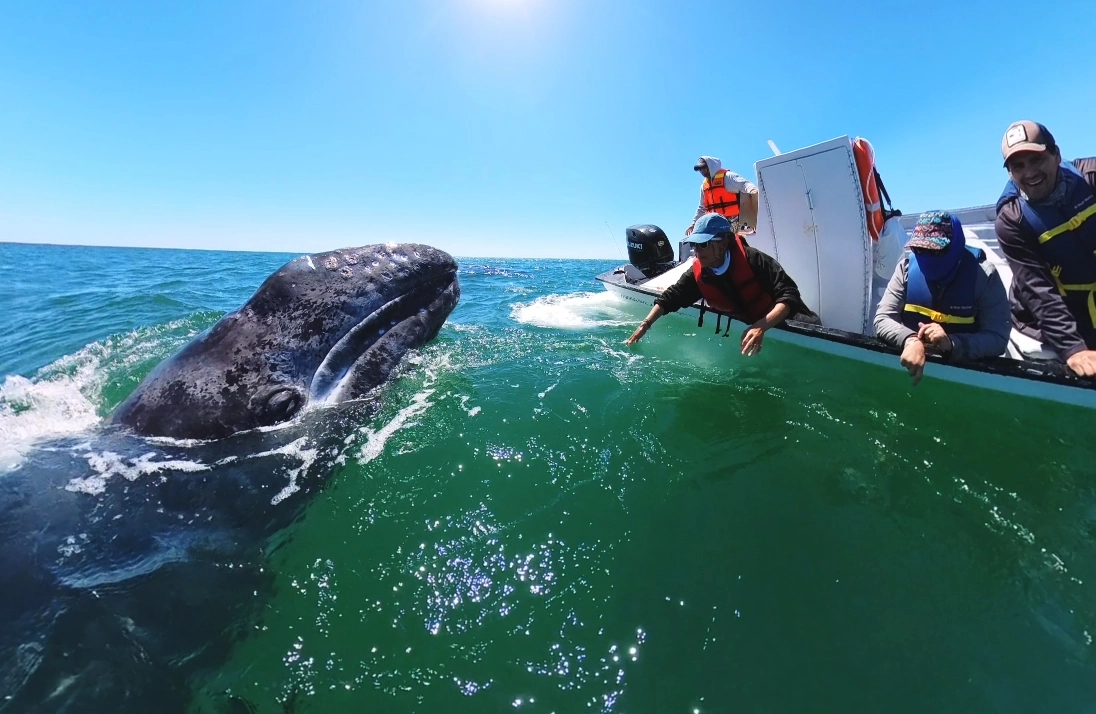The 40-ton gray whale stretches her massive head out of the murky water next to our small boat so that we can bend over the railing and pet her chin. She opens her mouth so we can scratch her tongue, which weighs about 3,000 pounds. Then the 40-foot-long giant turns onto her back for a belly massage. Finally, the mother of a two-month-old calf holds up her baby on her back so we can give it some love, too. The calf’s skin feels surprisingly soft, like smooth silicone.
“Their calves are just like human infants,” naturalist Jim Dorsey explains on the boat, “bumping into you, tumbling, playing. They don’t know their own strength yet.” When our 20-foot skiff (called a panga) turns back toward our camp at the shore of the San Ignacio Lagoon after 40 minutes, the two whales follow us like puppies that crave more attention.
According to Dorsey, three lagoons on the Pacific coast of Baja Sur, Mexico, are the only places in the world where wild animals seek physical contact with humans without the lure of food. The San Ignacio Lagoon is the smallest of the three lagoons. Its salt content is three times that of the open ocean and therefore an ideal nursery for gray whales. Their young can hardly swim after birth and the water’s high salt content makes the calves naturally buoyant. More than 3,000 gray whales migrate from Alaska to Baja every winter, 5,000 miles each way, with many females giving birth in the safety of the lagoons, before making the long trek back to Alaska’s nutrient-rich waters in the summer. Scientists counted 268 whales in the San Ignacio Lagoon this season, 50 of them mothers with calves.
Gray whales live up to 80 years, “so the older whales might still remember the massacres,” says Dorsey, author of The Lagoon, who has been visiting the lagoon and guiding tours for two decades. Dorsey speculates that the grays “were always friendly; humans just never gave them the chance to show it.” The behemoths were mislabeled “devil fish” during whaling times when mothers angrily defended their calves. “They do not kill their own, and they do not fight among themselves. They openly display affection and protect the weaker among them.” While the leviathans could easily sink our skiff with a strike of their massive tail fluke, no whale attacks on ships have been reported since the whaling stopped. Dorsey believes in a close kinship between humans and whales. “A whale has every single bone from its shoulder to the tip of its flipper that you and I have,” Dorsey says, explaining that the whales’ ancestors walked on earth millions of years ago before they took to the seas. The gray whale was an easy target for hunters: it’s the slowest of all whales, swimming at a leisurely pace of three to six miles per hour. Unlike dolphins, it does not echolocate and therefore closely hugs the coastline to navigate. We know the Indigenous Cochimí honored the whales because they drew them in ancient cave paintings on the Baja California peninsula.
Unusually close whale encounters with people like the ones in the San Ignacio Lagoon today are more than an unforgettable, emotional tete-a-tete that moves people to tears. They ensure the protection of one of the last largely undisturbed whale nurseries on the planet. Since 1988, the San Ignacio Lagoon has been part of the largest nature reserve in Latin America, the El Vizcaino Biosphere, and since 1993 also a UNESCO World Heritage site. The model, championed by the locals, scientists, world-renowned activists and the Mexican government, is being copied around the world by other communities that are seeking to preserve their natural treasures. The whales, nature and humans all benefit from the cooperation — during peak whale season from January to early April, fishing is banned. The locals make a living by operating the eight tourist camps along the lagoon or the limited whale watching boats. “This is the only lagoon that does it right,” says Dorsey, who is part of our 12-person visitor group. “I have been to Bahia Magdalena further south that is not part of the reserve and watched whale boats harass the whales. I will never go back there.”
At San Ignacio Lagoon, a member of the local cooperative watches from a boat all day long to ensure that tourists and boat captains observe the rules. The boat captains must not approach the whales; they have to wait for the animals to initiate contact. If a captain repeatedly ignores warnings, he will lose his license and thus his income for the tourist season.

An unnaturally high number of strandings along the Pacific Coast over the last three years has worried scientists, who have observed 25 percent more malnourished whales than in previous years. They blame ship strikes and the diminishing of the whales’ favorite food, krill, a tiny crustacean in the Arctic, due to warming waters and increased ocean acidity.
Gray whales play an outsize role in the ecosphere, and their capacity to mitigate climate change has only recently been discovered.
“Everybody thinks we want to protect the whales because they’re charismatic and magnificent,” Sri Lankan whale researcher Asha de Vos told me. “But we tend to forget the purpose they serve. They’re ecosystem engineers — without them, the oceans wouldn’t function properly. The whales dive to find nutrient rich meals at the bottom of the ocean. When they come back up, their poop with all those nutrients spreads on the surface of our oceans and feeds the phytoplankton, tiny microscopic algae. The phytoplankton are super important because they are basically the bottom of every marine food web. Everything exists in the ocean because phytoplankton exists. The more we have, the better.”
De Vos calls on humans “to respect these animals in their own homes, not just for their sake, but also for our sake because they also help fight climate warming. Did you know that whale carcasses collectively transport about 190,000 tons of carbon?” she asks. “Because the whales are giant, they can hold a lot more carbon. When a whale carcass sinks to the bottom of our ocean, that carbon is trapped and doesn’t get released into the atmosphere, or at least not for a very long time. We call it a carbon sink. It buffers us from some of the worst impacts of climate change. It also provides a food source for the species that live down there.”
The lagoon is not just a safe haven for whales but also for other species. Coyotes patrol the lagoon during low tide, and camp owner Maldo Fischer warns not to leave anything outside our cabin doors we’re not prepared to lose to a nosey coyote. Bat rays scatter in the shallow water when we wade into the lagoon. Bottlenose dolphins surf the waves next to our boat. Pelicans kamikaze dive for sea bass, osprey catch halibut to feed their young in their massive nests perched atop our huts, cormorants float waiting for their next catch and plovers pick over the sand. When our camp cook, Catalina Fischer, wants oysters or scallops, she sends one of her sons out into the lagoon to collect a few handfuls fresh from the water.
The fight to preserve the lagoon was hard-won. Massive piles of dried shells beside the dirt road are a stark reminder of the lagoon’s exploitation in the past.
Maldo Fischer, the owner of Baja Ecotours, which operates the camp and the whale watching boats we’re using, was the leader of the local movement to fight Mitsubishi. The Japanese company had singled out the rich salt flats of San Ignacio in the early 1970s to build the world’s largest salt factory on the shores of the lagoon, aiming to net seven million tons of industrial salt every year. When it set up a salt factory in a lagoon farther north, the whales stopped frequenting that area. From Christopher Reeve to Margaret Atwood, Octavio Paz to Glenn Close, many of the world’s best-known environmentalists and artists made the trek to the remote San Ignacio Lagoon to protest. The Natural Resources Defense Council collected more than a million signatures against the development in the decades-long fight. But it took a visit from then-president of Mexico, Ernesto Zedillo, and his successor, Vicente Fox, whose granddaughter petted a whale in the lagoon, to finally cancel the company’s plans in 2000.
Weighed down by negative news?
Our smart, bright, weekly newsletter is the uplift you’ve been looking for.The Baja model of communal protection has been copied by communities around the world, from Maine to Ghana. Mexico is home to some of the worst exploited fishing grounds in the world and some of the most intact reefs, sometimes surprisingly close to one another. The reason is that many fishermen in Mexico have been organized in cooperatives since the 1940s. Some of the co-ops pursue maximum profit and pull from the ocean as much as they can; others advocate for sustainable practices. The difference in results is clearly visible today: while the profiteers’ nets come up increasingly empty, the sustainable cooperatives showcase clean, plastic-free bays, freshly painted houses and smart concepts for directly marketing their sustainable catch of sea bass and halibut to their international customers.
While other fishermen start collecting abalone and throw their nets as soon as the season starts, the fishermen in the San Ignacio Lagoon and in nearby Punta Abreojos voluntarily leave their boats in the bay or rent them out for whale watching until the end of April. By then, the abalone and fish are bigger, which means the fishermen’s nets are fuller, while fish numbers recover more easily. “At first, some of us fishermen were angry,” Fischer admits. “We didn’t like to be told when to fish and when not to. Now we see the whales as part of our family because we’ve been working with them for so many years.”
Some areas have been closed off for fishing entirely, and even where it is allowed, gill nets are no longer permitted. These protected areas are not huge and would be more effective were they bigger, but even protected micro reserves are surprisingly successful, according to the local Ecosystem Science Program.
Fischer, the quiet, assertive camp owner, came to San Ignacio as a fisherman before founding Baja Ecotours and rising as one of the elders in the community. His grandfather Frank Fischer was a German merchant who visited town on his ship in 1910, fell in love with a local woman and stayed to work as a car mechanic. Now Maldo Fischer sees the protection of the area as his legacy. His wife, Catalina, meticulously collects every scrap of paper and plastic separately, to turn it into seats and toys for the local schools. Food leftovers are donated to a local ranch as food for their pigs in return for fresh vegetables. The outhouse toilets are flushed with marine water, and fresh water is used as sparingly as possible. You don’t see a single plastic bottle or wrapper on the shores.
Of course, overfishing is a global problem. The world’s hunger for tuna and sardines is being satisfied with brutal exploitation. More than three-quarters of the world’s oceans are severely overfished. But these Mexican cooperatives have found an effective, reproducible solution for their bays.
According to Aburto-Oropeza, a few factors are crucial for long-term success. First, there has to be a valuable resource, such as whales, oysters, or lobster (as in Maine). Second, the area must be rigorously protected so that fishermen from other areas can’t swoop in and exploit the riches. Third, Aburto-Oropeza considers trust an essential element. The members of the cooperatives must trust each other as well as the scientists and the regulating bodies. Too often, scientists from other cities or even foreign countries dictate what a community should do, or lawmakers pass regulations without knowing the specific challenges on the ground or have no means to enforce the rules. Fourth, the fishermen need an income during the months when fishing is on pause. In poor remote areas such as around the San Ignacio Lagoon, there are simply no industries that can offer employment. In San Ignacio, the necessary income comes from whale watching tours; in nearby Punta Abreojos, the fishermen are also being paid by scientists to count and document the fish stock.
Fifth, the cooperative has to agree on a long-term vision. It’s not just about the harvest of one or two seasons but about securing the health of the environment for coming years and decades.
With Maldo Fischer as the chairman of the association, the model works fantastically with the gray whales in San Ignacio, but similar concepts have been implemented by lobster fishermen in Maine, where lobsters were nearly extinct and have recovered after the fishermen implemented sustainable practices. And the idea not only protects the sea. In Germany, communal stewardship of farmland (called “Allmende”) has traditionally proven to be healthier for nature and for its stewards, when long-term health of nature and inhabitants is the common goal.
In San Ignacio, the whales don’t know that they contribute to their own survival when they play with our boat like a tug toy. Our boat captain, Cuoco, has nicknamed a female whale “Heart” because of a heart-shaped white mark on her flanks. She rubs her side on the fiberglass hull of the sturdy boat and makes eye contact. Her iris is black, within a deep brown eye the size of a fist. Unnervingly, she holds eye contact for what seems like an eternity but is probably not more than a minute as our skiff bobs up and down with the waves. Dorsey is convinced that the whales recognize the captains and himself from previous visits. “It’s an intelligent look inquiring about the strange creature in her domain,” he writes in his newly published book. “We have shared this planet together for eons, but many people have no idea just how connected we are to these animals.”




